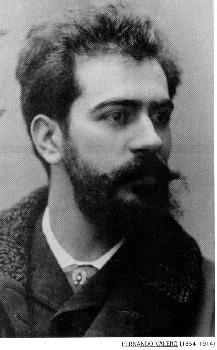Fernando Valero
I would like to thank Thomas Silverbörg for the recording.
Valero grew up in Córdoba and studied law in Granada. While also comtemplating to become a painter, he had enough vocal talent to sing
in two zarzuelas already as an amateur; he was heard by Enrico Tamberlick, who
convinced him to study voice. And so Valero did, in Granada and Madrid (among others with Tamberlick himself).
He made his professional debut at the Teatro Real in Madrid on 4 February 1878, in the secondary part of Narco in Poliuto. After a few
further appearances at the Real, he was hired by the Teatro de la Comedia for main roles, and made his debut there as Ernesto in May 1878. In
November of the same year, he was already back at the Teatro Real, this time as a first tenor; he stayed – with guest appearances in
Sevilla, Valencia, Granada and at the Liceu in Barcelona – until moving to Milano for further studies in 1881.
He made his Italian debut, still in 1881, at the Teatro Brunetti in Bologna, and appeared also at the Carcano and the Dal Verme in Milano, as
well as in Florence and Venice. In 1882, he sang in Buenos Aires, at the Teatro Colón (and married a Russian soprano colleague there).
1883 earned him success at La Scala in Milano, where he continued to have great success until 1895. In winter 1883/84, he sang in St.
Petersburg, which was his definitive international breakthrough – Vienna, Berlin, Lisbon, Naples, Rome and Genova followed shortly, and
he also returned to Venice and Florence, and very regularly to the Teatro Real and the Gran Teatre del Liceu. In 1890, he made his London and
Palermo debuts, and in late 1891, his Metropolitan Opera debut; he stayed for four and a half months, singing both at the Met proper and on
Met tours to Chicago, Boston or Philadelphia, a total of 28 performances.
He returned to Spain in 1892, and to Italy in 1893. In 1897, he caught tuberculosis, and had to pause his career for a while. After he resumed
it, success was not quite what it had been before. In 1904, he retired to St. Petersburg, where he taught voice. He died after surgery in a
Moscow hospital.
Valero's repertory ranged from Nadir to Don José, from Raoul to Lohengrin, from Duca to Turiddu; the latter was his most famous role. G&T, London, 16 June 1903 3922R Dormi pure (Scuderi) 52716 3923R Rigoletto (Verdi): La donna è mobile unpublished 3924R Cavalleria rusticana (Mascagni): O Lola 52717 3925b Cavalleria rusticana (Mascagni): Viva il vino 52718 3926R El amor es la vida (Espinosa de los Monteros) 52719 G&T, London, 15 July 1903 4041R Cavalleria rusticana (Mascagni): O Lola unpublished 4042R Rigoletto (Verdi): La donna è mobile unpublished G&T, Milano, about November 1903 Con279 En la soledad (composer?) unpublished Con280 Rigoletto (Verdi): La donna è mobile 52009 Con672 Mattinata (Tosti) 052022Source 1: Gesellschaft für historische Tonträger, Wien; source 2 |
